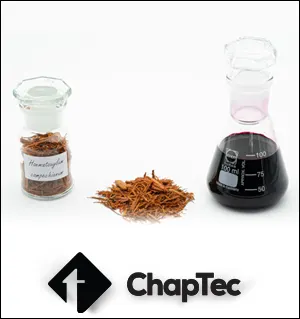Hematoxylin
Discovered at the end of the 19th century, this Mexican tree extract stains only when oxidized (naturally by aging or chemically) and coupled with a metallic mordant.
It then becomes cationic and will stain anionic acids, like nucleic acids.
The most popular mordant is aluminum and acetic acid is often added to prevent excess oxidation.
Depending on the concentration, the hematoxylin can be used as a regressive stain (overstain and then selectively decolorize). This is how Harris hematoxylin is mostly used. It can also be used as a progressive stain that does not require decolorization but takes longer to stain like Mayer’s and Gill hematoxylins.
In all cases it will have to be submitted to a bluing agent, an alkaline solution like tap water or Scott’ss substitute as its natural red color does not provide enough contrast.
Ferric hematoxylin like Weigert’s is used with two different solutions, hematein and mordant mixed just before use or in sequence.
Nothing has yet been able to replace hematoxylin for nuclear staining than. You just have now to select which one will give you more satisfaction and please your pathologist!
Q: What is hematoxylin and how does it work?
A: Hematoxylin is derived from a Mexican tree extract. It stains only when oxidized and used with a metal mordant, binding to nucleic acids.
Q: What is the most common mordant used?
A: Aluminum, and acetic acid is often added to prevent over-oxidation.
Q: What is the difference between progressive and regressive hematoxylin staining?
A: Regressive stains are overapplied and then selectively de-stained (e.g., Harris). Progressive stains (e.g., Mayer, Gill) develop to the correct intensity without de-staining.
Q: Why must hematoxylin be “blued”?
A: Because its natural reddish color lacks contrast; exposure to alkaline solution turns it blue.
| 470, avenue Laurendeau, Montréal-Est (Quebec) H1B 5M2 | |||
| Phone: | 514 498-3620 | Toll free: | 833 498-3620 |
| Email: | chaptec@chaptec.com | ||


